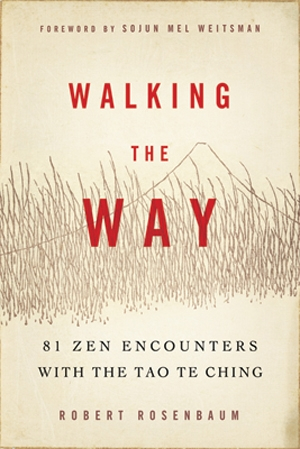Walking the Way
81 Zen Encounters with the Tao Te Ching
An examination of the history of Taoism in China reveals a long-standing and mutually influential relationship with Buddhism.
Readers in Taoist and Buddhist traditions often find overlapping ideas among the major texts—a correspondence that provides the set-up for Robert Rosenbaum’s “Zen encounters” with Lao Tzu’s Tao Te Ching.
In each of eighty-one brief chapters, he offers his own translation of a verse from the Tao, followed by a “teaching” in the Buddhist mode, concluding with a personal reflection or anecdote from his own life. For example, the idea of “more” is the subject of a Lao Tzu verse, which ends, “When the work is done, stop: retire and rest. This is the Way of heaven.” Rosenbaum’s Zen reading begins, “More is not better. Sometimes, more can be the enemy of enough; when an amount is just right, anything more than enough is extra.” Finally, a personal reflection: “I, too, am often prone to offer a “fix” to people I love when I see them suffering. I want to do more to help them and find it difficult to just stop, offer myself as witness, and trust the present of my presence is enough.”
The combination of these three elements results in an enriching and approachable text that helps to unlock passages that might otherwise be challenging to a lay reader.
Rosenbaum offers his insights not as a how-to manual but as “an invitation for us to practice finding our Way,” modeling Zen’s instruction to “realize your original self.” In this spirit, newcomers will find guidance and encouragement for managing daily situations along with ethical dilemmas.
After studying multiple translations of the source text and meditating on the meanings to offer a response in his own style, Rosenbaum has produced a compassionate, down-to-earth perspective of the Tao Te Ching. This is not a scholarly work but rather a personal examination of possible meanings to a text full of paradoxes that can be hard to make sense of without an interpretive aid. An extensive bibliography and small collection of original poems inspired by Lao Tzu are included in the appendix.
Rosenbaum practiced neuropsychology and psychotherapy for thirty years, has studied Zen under Sojun Mel Weizman, is a qigong teacher, and is the author of Zen and the Heart of Psychotherapy. Years of hiking in the Himalayas, a divorce and nearly fatal stroke, and experiences working with patients in medical settings around pain and mindfulness add texture and resonance to his text.
While students and practitioners of Taoism or Buddhism will likely gravitate to this book, readers with interests in mindfulness, meditation, empowerment, and mental health will find it a thought-provoking read, too.
Reviewed by
Holly Wren Spaulding
Disclosure: This article is not an endorsement, but a review. The publisher of this book provided free copies of the book to have their book reviewed by a professional reviewer. No fee was paid by the publisher for this review. Foreword Reviews only recommends books that we love. Foreword Magazine, Inc. is disclosing this in accordance with the Federal Trade Commission’s 16 CFR, Part 255.

